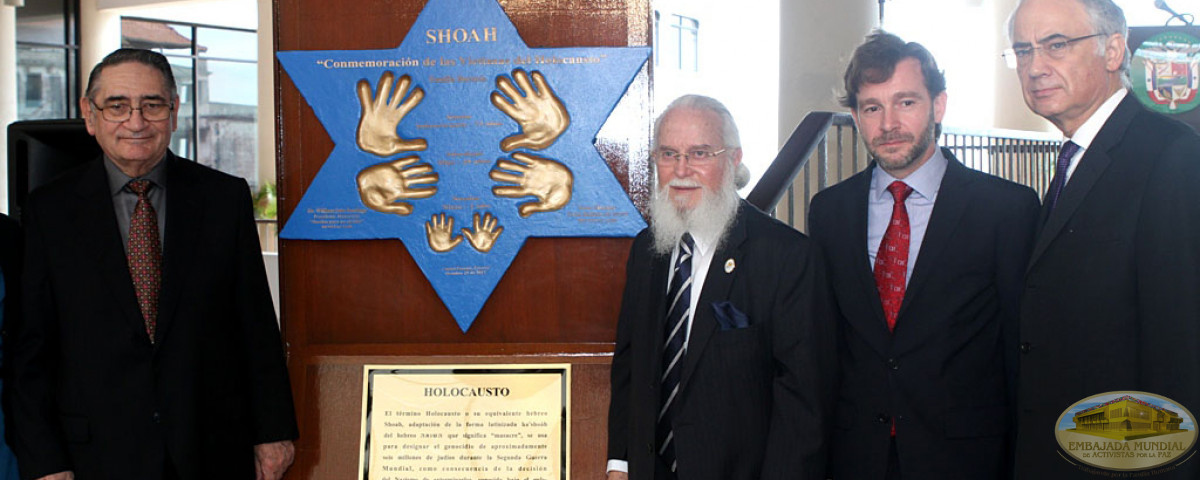
SPEECH GIVEN AT THE MINISTRY OF FOREIGN AFFAIRS
PANAMA
Thursday, November 29, 2012
Plaza Bolívar, Ministry of Foreign Affairs
Panama City
His Excellency Francisco Álvarez de Soto, Deputy Foreign Minister of the Republic of Panama; His Excellency Alexander Galilee, Israeli Ambassador to Panama; Mr. Simón Burstein, Holocaust survivor; Mr. Luis Guarán, Director General of Economic International Relations of the Ministry of Foreign Affairs; Everardo de León, honorable deputy of the Central American Parliament; the diplomatic body present; Rabbi Gabriel Benayón of the Bethel Jewish Community; members of the Jewish community; ladies and gentlemen, good morning.
Today marks the beginning of the campaign Traces to Remember in Panama, an initiative that aims to promote reflection and increase the participation of ordinary citizens in the defense and protection of fundamental rights, especially the right to life. The fact that the Foreign Ministry is the first to welcome this campaign is an additional reason to praise the work of the Panamanian government in the consolidation of the Human Rights Division of the Ministry of Foreign Affairs as part of a universal system for the protection of said rights.
Only until very recently in human history have these rights been spoken of as an integral part of the human essence, which only shows that it has taken us a very long time, as a species, to mutually recognize each other on equal terms, which as of today, even this has not been completely achieved.
On December 10, 1948 in Paris, the UN issued the Declaration of Human Rights as a result of the atrocities committed in World War II, and in particular due to the savagery of the Holocaust. The UN did so with the intention of turning that Declaration into a type of international law that would compel member tates to commit to recognize the minimum guarantees and basic rights of all people.
For the Jewish people, however, that declaration came too late, because since time immemorial, they have suffered from an opposition and disdain that accumulated with the weight of the centuries, until it overflowed as the sum of all hate, finding in the fanatic nationalism of Germany the instrument of destruction perfectly suited for its idiosyncrasies: the law of that country.
As a result of this attitude, millions of Jews first suffered segregation, expropriation, as well as work, marriage, and travel restrictions, until the horrid idea known as the “Final Solution” occurred, resulting in the killing of six million Jews, and millions of other people of different nationalities.
This was also possible largely due to the fact that the Nazi government began building up an exaggerated power in their leader, increasingly eliminating the supervisory bodies and political opposition that could have kept it within the bounds of normality and justice.
Amid the chaos and panic, figures such as Raoul Wallenberg, Arístides de Souza Mendes, and José Castellanos Contreras emerged. These were diplomats who courageously saved thousands of lives while risking their own, becoming role models to follow in such situations, which are sadly still frequent today, making embassies the only possible refuge from the persecution brought on by totalitarian governments.
Therein lies the importance of democracy as the best form of government created to date, despite having fragile alliances, for democracy is represented in the stage of iron and clay in the statue that King Nebuchadnezzar saw in the political vision narrated in the book of Daniel, which traces the trajectory of global politics.
Democracy seeks to avoid the accumulation of power; for example, only a select few have the privilege to make laws. This entails an enormous responsibility to create laws that not only result in the progress and solution of citizens’ needs, but also guarantee personal and collective human rights, justice, equality, respect, and above all, peace.
That is precisely where the campaign Traces to Remember comes in.
TRACES TO REMEMBER can be of great assistance to democratic governments, as it has a very simple but important and effective pedagogical component, because it creates opportunities of reflection regarding our own responsibility and capacity to respond to unjust situations that affect others.
For this reason, I insist on emphasizing that this is a very appropriate opportunity to develop such an initiative, and I welcome the decision of the Ministry of Foreign Affairs to receive this commemorative plaque.
Today we have the privilege of having Holocaust survivor Simon Burstein with us, whose presence is also a testimony to the survival of Israel, of the Jewish people.
And they didn’t survive only to inhabit a geographic space; it is also necessary to acknowledge that what some call the “Jewish genius” has been of enormous benefit to the human race.
Today, I welcome the presence of the members of the diplomatic body, and I invite them to join our campaign, Traces to Remember, as well as similar projects that defend human rights.
I express my deepest gratitude to the Ministry of Foreign Affairs of Panama for hosting this event, and to the Ambassador of Israel for the invitation.
Dr. William Soto Santiago
Ambassador of the Global Embassy of Activists for Peace